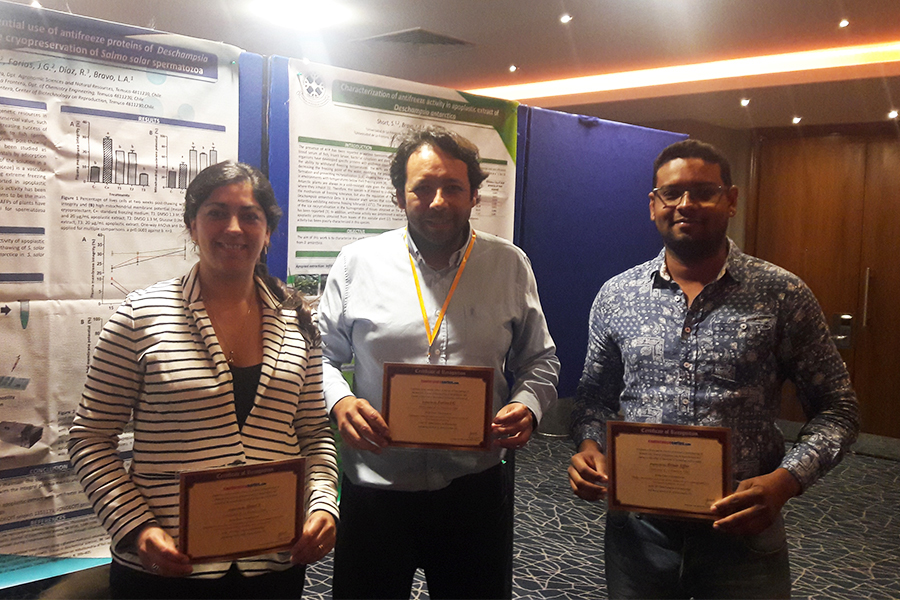|
Dr. Jorge Farías and the students Stefania Short and Bryan Effer presented their research advances related to an international project for the production of a leukemia drug and the characterization of antifreeze activity in apoplastic extract of Deschampsia Antarctica.
|
The motivation for the participation of the Doctoral Program in Science with specialization in Applied Cellular and Molecular Biology of the Universidad de La Frontera in this international event in London with presentations by Dr. Jorge Farías and the students Stefania Short and Bryan Effer was to share their scientific advances and create international links.
The UFRO representatives participated in the 20th Global Congress on Biotechnology and the 3rd International Conference on Enzymology and Molecular Biology. “This is a high-level international event that is characterized by the exchange of scientific advances and the participation of well-known universities and companies in the field of biotechnology”, Dr. Farías said. He also specified that studies have been presented that are linked to international projects and to a Fondecyt (National Fund for Scientific and Technological Development) project led by himself (No. 1151315) and another one led by Dr. Leon Bravo (No. 1151173).
For the student Stefania Short, this was an important opportunity to show the advances of her doctoral research work, which is related to the characterization of an antifreeze protein of Deschampsia Antarctica and its potential use in salmon cryopreservation.
“I presented part of the work I did during an internship in Canada, mainly the characterization of the anti-freeze protein in the plant, and also what I have done here in the laboratory, the evaluation of its cryoprotectant capacity in the freezing process of spermatozoids of Atlantic salmon”, she explained.
Bryan Effer also presented his degree research advances he did within the framework of an international project with the participation of the UFRO and the FAPESP (Sao Paulo Research Foundation in Brazil), in which he wants to produce the first humanized drug for leukemia.
“L-Asparaginase is an enzyme used in drugs for the treatment of acute lymphoblastic leukemia and the work we present is the recombinant production of this enzyme, but in a different version as you can find it on the market nowadays, which basically consists of an enzyme modified with humanized sugars. The objective is to decrease secondary effects, which is the main problem of this drug at the moment”, Effer explained. He will also go to the prestigious Cold Spring Harbor Laboratory in New York, which holds nine Nobel Prices at present, in order to spend three months there and to learn about genomics technologies.
Dr. Jorge Farías commented that the presented work gained the interest of the participants in the international event because of the high level they are at, and not only the interest of the scientists, but also of the ones who are linked with the entrepreneurial sector, since it is a congress to promote knowledge transfer to the company.
At the same time, the director of the Department of Chemical Engineering values these events, since they permit to show, beyond the borders, the passionate work they do in the UFRO laboratories and the quality and level of the Doctoral Program and, at the same time, to strengthen their international networks.
It is also worth to mention that the resume of the presented studies have been published in the Journal of Biotechnology & Biomaterials. The studies are called:
-“Design, construction and extracellular expression of L-asparaginase from Dickeya chrysanthemi in yeast”
- “Study of the potential use of antifreeze proteins of Deschampsia antarctica in the cryopreservation of Salmo salar spermatozoa”
- “Characterization of antifreeze activity in apoplastic extract of Deschampsia antarctica”
 Written by: Dirección de Comunicaciones This email address is being protected from spambots. You need JavaScript enabled to view it.
|
 Written by: Dirección de Comunicaciones
Written by: Dirección de Comunicaciones